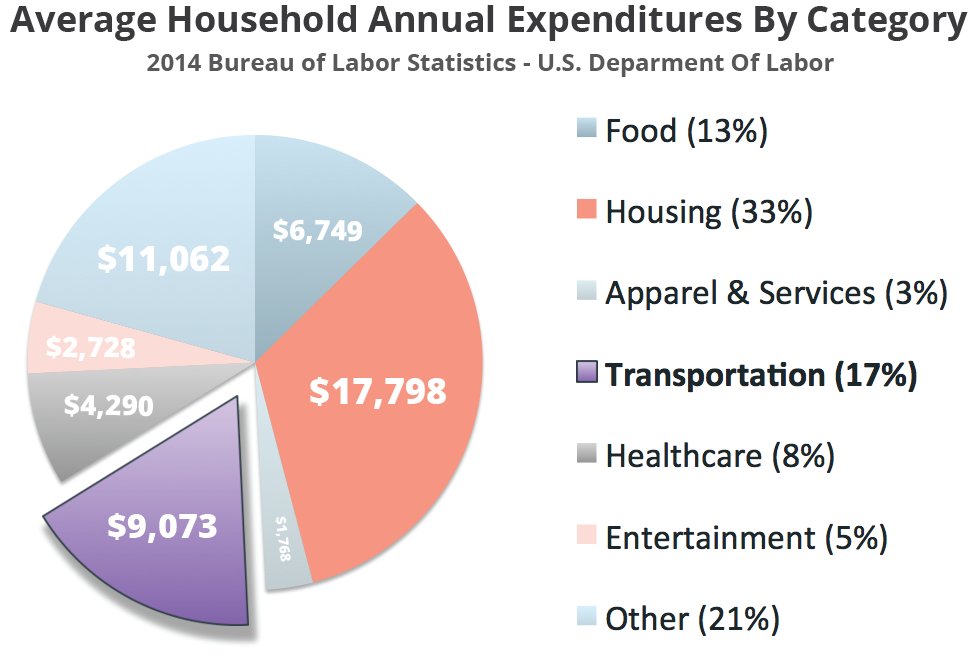Cars are expensive... It's a given. But are we unnecessarily spending on our car, when we don't have to? Below are the easiest ways to save...
 $9,073 was how much the average American household spent on transportation alone last year,1 which
was more than any category except housing. Shockingly, transportation
spend was more than healthcare, clothing, and entertainment combined!
$9,073 was how much the average American household spent on transportation alone last year,1 which
was more than any category except housing. Shockingly, transportation
spend was more than healthcare, clothing, and entertainment combined!
How much can you reasonably save here? Well, following the tips in this article result in an average yearly savings of $1,605.40!2
Part I: 3 expert steps for cutting your Car Insurance bill
Yes, you’ve likely heard that you can save on car insurance, but the reality is it’s not as simple as just calling Geico® (or any carrier). If it were that easy, Geico® wouldn’t have to spend over $1 Billion in marketing3 because we assume there would be more than enough word-of-mouth business.Geico® does have good rates for some, but for others they could potentially charge a relatively high premium; and we don’t recommend any single insurance for that reason. Instead, we’ll focus on a proven way to reduce your monthly premium regardless of the carrier:
Step 1: Use QuoteWizard , or any other free, multiple-quote provider, to get the most quotes in the quickest amount of time. Using a multiple-quote provider saves you from having to go to a bunch of different websites.
Step 2: Once you enter your information on QuoteWizard , you will receive a phone call asking you a couple more questions. These questions are crucial because this is where you really save. You could ignore the phone call, but then you won’t get certain discounts that come up during the conversation. This step is where you really get the savings and here are the best ways to do it:
-Don’t lie, but make sure to give the lowest reasonable estimate for the amount of miles you drive. The less miles you drive, the lower the cost of your insurance. Equally as important, if you sometimes carpool to work make sure to mention it. You may be able to claim you mostly drive your car for pleasure which costs less than driving for work and pleasure.4
-*If you have a cheap car,* you might want to consider going higher on the comprehensive coverage deductible. The higher your deductible, the less expensive your premium is. Proceed with caution here as if you are in an accident you could pay up to the deductible.
-If you are a good student, have a clean driving history, or have a good credit score make sure to mention it. Some insurers give good discounts for those they deem reliable.5
-If you have a poor driving history, you have an opportunity to make up for it in most states by completing a driver’s improvement course. As an example, New York gives you a 10% reduction in the base rate of your automobile premium for three years when you complete their course.6
Step 3: Once you are given your quotes, now you need to call your current carrier to negotiate. If you followed the first steps, chances are you now have a cheaper quote. However, you are also in a great position to do even better because you have leverage. This means that most likely your current carrier doesn’t want to lose your business, but you now have a reason to leave them. They will often see this and then be willing to give you an even cheaper deal, or at least match your offer.
Following these steps shouldn’t take you more than fifteen minutes and the average savings for comparison shopping is $859 per year.7
Part II: How to save on gas, without changing your car
Gas isn’t as expensive as it was years ago, which is quite a relief. That doesn’t mean that you should settle for spending what everyone else is. Here are the easiest and most important changes you could make, based on information from the U.S. Department of Energy and other scientific studies:Step 1: Check your tire pressure once a quarter. The average car loses $79 per year on gas from under-pressurized tires.8 Checking your tire pressure takes just a few minutes.
Step 2: Open your windows at lower speeds, but use your AC at higher speeds. Due to the aerodynamic profiles of cars, the rule of thumb is to open your windows below 55 miles per hour and turn on your air conditioning when you’re above 60mph.9 During the summer months AC use can reduce fuel economy by 25% or more,10 which equates to $154 per year in costs for the average car.2
Step 3: Turn off the car any time you are idling for more than a couple of minutes. It takes about ten seconds worth of fuel to restart your car as opposed to a half gallon of fuel per hour when you’re in idle.11
Step 4: Use your AAA® membership, when filling up at the pump. If you don’t currently have a gas credit card, check out CreditCards.com™ to see which is the best for you. The gas card alone would save you $123.40 per year!2
Too many credit cards in your wallet? Many gas chains also offer AAA® discounts. Depending on your location, you could save $0.03 per gallon.12 It’s not that much, but why waste the money when it takes just seconds to swipe your AAA® card at the register or the pump? If you don’t already have a AAA® card, this perk alone may not be worth signing up.
Changes to your driving habits aren’t going to happen overnight, but in the end you’ll see the value because you’ll save an estimated $623 per year2 just from these tips.
Part III: If you have a car loan, you need to lower your interest rate (as soon as possible)
*Skip this section if you don’t have a car loan.Interest rates are close to the lowest they’ve ever been. Meaning if you have a car loan, now is the cheapest time to get a better rate because interest rates are starting to go up. We’ve found lenders that are offering as low as 1.99% APR.
How much does this save you? There are a lot of variables at play like how much you owe, how many payments you have left, etc. so to keep things simple we recommend checking out LendingTree’s free refinance calculator or any free, refinance quote site.
LendingTree and other similar sites find you with the best offers, and there are no obligations for just seeing your rates.
Part IV: Get paid to use your credit card at the pump
It’s pretty simple really, spend five minutes or so signing up for a “Gas Credit Card” and then use this card specifically for pumping gas. If you already have a gas card, then good for you – make sure to use it.If you don't have one, the best cards we found offer anywhere from 3-5% cash-back every time you pump up, and some of them have a nice bonus as well. Regardless of the bonus, just signing up for a gas credit card and using it will put $123.40 in your pocket every year.2
Conclusion
Tackling the second biggest yearly expenditure in your household can result in significant savings for your family. Savings of at least $1,605.40 per year!2 The best part is the tips we’ve suggested don’t require any drastic changes.Was this article helpful? If so, please share us with your friends by using the buttons below!
*Anti-graft agency
acted beyond its powers — LAWMAKERS
By Dapo Akinrefon & Rotimi Ojomoyela
THE Peoples Democratic Party Governor’s Forum yesterday described the
freezing of the personal accounts of Ekiti State Governor, Mr Ayodele
Fayose by the Economic and Financial Crimes Commission, EFCC, as gross
abuse of the constitution.
The forum, which spoke through its Chairman and Ondo State Governor, Dr
Olusegun Mimiko has therefore called on President Muhammadu Buhari to
call the anti-graft agency to order.
This came as the Ekiti State House of Assembly faulted the move by the
EFCC, saying it acted beyond its powers.
Reacting to the freezing of Fayose’s account by the EFCC, Governor
Mimiko noted that EFCC’s action has portrayed the nation as one in
crisis.
A cross section of PDP Governors Forum
A cross section of PDP Governors Forum
Expressing his displeasure over the step, Mimiko said EFCC cannot
interfere with the account of a sitting governor, adding that, it was
contrary to Section 308 of the 1999 Constitution.
In a statement, the Ondo State governor argued that if the intention is
to suggest any criminal infraction or fraud against the governor, the
agency should have sheathe its sword till he (Fayose) vacates office.
While he warned that the country is drifting towards totalitarianism, he
insisted that the account of any individual could only be frozen after a
court of competent jurisdiction has so ruled or an interim order by a
court of competent jurisdiction is granted to the anti graft agency.
EFCC acted beyond powers — Ekiti Assembly
Reacting to the development, the Ekiti State House of Assembly described
EFCC’s action as ultra vires.
Describing the action as null and void, the Assembly said the order
formed part of the resolution of the House, which also witnessed passing
of a vote of confidence on Governor Fayose, at its plenary at the
Assembly complex in Ado-Ekiti.
Speaker of the House, Mr Kola Oluwawole, and Leader of Business, Mr
Tunji Akinyele, at plenary, noted that being the second anniversary of
Fayose’s election, it was a sad commentary on the nation’s democracy,
that after having severally tried unsuccessfully to discredit the
election, the All Progressives Congress (APC)-led Federal Government had
resorted to arm-twisting to embarrass and cause discomfort for the
Fayose-led government in Ekiti State.
Passing a vote of confidence on the governor, the lawmakers said “the 26
of us in the House of Assembly are resolutely loyal to the governor and
his government and no amount of intimidation or monetary inducement can
sway us otherwise.”
Strike: Fayose, labour meeting deadlocked
Meantime, as the industrial action declared by the Ekiti workers
entered its fourth week, the meeting between Governor Ayodele Fayose and
the organised labour ended in a deadlock yesterday.
The meeting, which was called by the governor to interact with labour
leaders in the state on how to resolve the disputes that led to the
ongoing strike lasted for three hours and the union leaders were seen
wearing long faces while leaving the venue.
In a telephone interview, the state chairman of the Nigeria Labour
Congress, Mr. Raymond Adesanmi, told Vanguard that the strike would
continue because the meeting failed to resolve the contending issues.
“The governor listened to us and promised to get back to us. We are also
going to have our own meeting on Wednesday to review the situation but
the strike continues. It is either three months salary or no talk.”
Read more at: http://www.vanguardngr.com/2016/06/fayoses-account-call-efcc-order-pdp-govs-tell-buhari/
Read more at: http://www.vanguardngr.com/2016/06/fayoses-account-call-efcc-order-pdp-govs-tell-buhari/










0 Comments